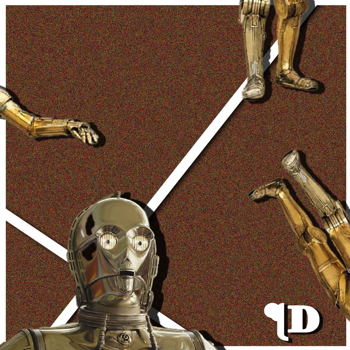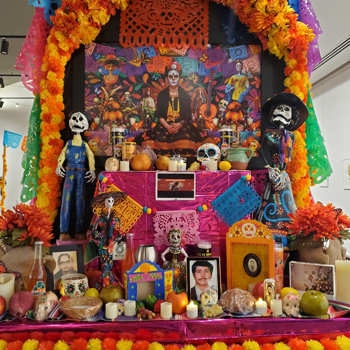Possum Parade
 Artwork by DALL·E
Artwork by DALL·E
“No more Richard Scarry memes. Let’s manifest this shit,” so spoke Liz Lilly, influencer-cum-mayor, in her inaugural speech to a mix of raucous applause and local confusion.Mayor Lilly’s victory in Buckley, Texas, a small community in the state’s northern plains, represents yet another successful example of Hollowing, an internet trend which, ironically, aims to do just the opposite. Rather than being named for the act of emptying something out, it is thought to have derived its title from the fictitious Gilmore Girls’ town of Stars Hollow, which represents, for the trend’s adherents, a certain municipal ideal.
On an individual level, Hollowing involves moving to a town and being a person with standing, which can roughly be defined as a person with a role that contributes meaningfully to the immediate community, and relationships that fill the spectrum from intimate to enemy; preferably, these antagonisms should be based on ideological differences, but since the majority of hollowers adhere to a certain brand of social-liberalism/financial-conservatism as represented by one of the nation’s major parties, and since hostile relations with the natives are strongly discouraged, ideological differences worth beefing over can be hard to come by, so rivalries develop, more often, according to interpersonal dynamics, which is, as they say, good enough for government work.
As for the opposite end of the spectrum, the intimate side, things are proving slow to develop there as well. Despite many town squares across the country looking like college campuses on dorm move-in day, with all those vehicles leaving the cities to fill the lots around tired county courthouses, and drivers marching off to put down offers on homes within walking distance, acquired habits remain a real bitch to break. Bar trivia, book club, and adult sporting events can only go so far in overturning deep sociofugal cultural structures. While Hollowing puts nominal emphasis on one of the major attributes of a person with standing being the holding of a role that contributes to society rather than simply a job that does so, meaningful connections have been showing promising signs of germination largely in the workplace.
Butchers have reported vastly increased applications for apprenticeship positions. All those who lived brief lives of quarantine home bakers are digging up their sourdough starters and finding new and ingenious ways to reanimate them. Even former ACAB-chanters are filing paperwork for the police academy, for nothing brings all the moving parts of town together more so than an investigation, at least that is how it is on television.
These positions are being filled mostly part-time as those who are filling them tend to hold full time remote positions. Hollowing, however, puts great value on local business and self-employment, therefore to move to one of these small towns and take an available post in, say, the Wal-Mart bakery, would be to utterly miss the spirit of the movement. Co-ops have been found as an ideal solution in getting around both temporal and financial restraints, so that the new local bakery might be co-owned by seven partners, each of which operate as the baker for only a single day of the week. The coffee shop can be managed in much the same way, with the six other co-founders posting up with their laptops in the sun-filled cafe, conducting their other business on off days. Ditto: the tavern, the barbershop, the diner, etc.
“There used to be a cafe right here now that I think about it,” local retiree Bill O’Neil is reported as saying in the newly launched daily circulation, Buckley Express. He’d been approached by a junior reporter while sitting at the bar of Buckley Coffee Co. drinking a cup of black coffee. “‘It was called--oh what was it called? I cannot recall the name, but it was owned by the Sinclair family, I believe. They moved here from St. Louis and opened Sunrise Cafe, that was the name!’ Bill exclaims with a slap of the knee and a twinkle in the eye. ‘But it closed down, oh, back in ninety-nine, if I had to guess. I retired in oh-eight, was an optometrist, believe it or not. I’d been going to the McDonald’s out on the highway for coffee every morning since, but this is much closer to home. Coffee’s not the same, but then taste isn’t that important to me. Most the others, Jim and Victor, and them, they still go to McDonald’s, but I am hopeful that one day they will join me here.’”
Such is the flavor of most reportage in the Buckley Express, which is nothing if not devoted to local stirrings. The paper began appearing on everyone’s front door step at a major loss to its founders. They are hopeful it will integrate itself in the town as a necessary component, and that advertising money will start to come in to help prop up the business of publication, or at least soak up some of the losses. As long as it lasts, readers can expect to find such Steinbeckian front page stories as the following, entitled Tommy’s Piece:
Trucking a coffin-sized cooler of Lone Star, the latest batch of hollowers made their way up from ol’ San Antone, following the highway 281 through the hill country, over that pumped dry San Antonio River, then kept north over the Guadulupe and the Blanco, the Perdanales, the Colorado, and up into that dry country that stretches all the way to the little known Leon and Bosque Rivers, and on and on to the town of Buckley along the Brazos above Possum Kingdom. Along the way, the hollowers stopped at damn near every crossing to do some fishing or swimming or poking around, turning a few hour trip into a couple day odyssey.
Beyond Buckley, the highway continues north, splitting the nation in pretty neat halves, beginning down in the southern tip of Texas and running up through North Dakota, crossing rivers unknown to this reporter, except for maybe the ones cited in Lonesome Dove. The Canadian line transforms the roadway into Highway 10, and it continues on its northern trajectory until finally meeting its headwater in the Manitoba mining town, name of Flin Flon--no kidding: named for a prospector in a turn of the century dime novel who submarines down through a bottomless Rocky Mountain lake and emerges into a matriarchal mirror world where tin is currency and the streets are paved with gold. Story goes, a Saskatchewanean prospector who struck a rich vein of copper had been a fan of the novel and named his mine after the protagonist. The mine lent its name to the town, bing-bong-boom, Flin Flon, Manitoba, Canada.
There are a number of ways to divide up Texas, but most quickly turn nitpicky and quarrelsome in online forums. Then there is the Balcones Escarpment, a neat, twenty million year old geological shield running in a northeasterly curve from Del Rio to Waco, separating east from west, clear spring waters from muddy northern drivel, farming from ranching, breakfast tacos from breakfast burritos, and city from plains. Northwest of the escarpment is flat, rugged land, thin-soil easily given over to cedar invasion, but much of the town of Buckley has avoided this fate, as has Tommy’s piece which is instead a sea of buffalograss interspersed with high growths of big bluestem. Only two oak trees grow within his property lines, but down near the river he has big plans to plant a few more, as he narrated over the motor and the wind…”
Such pastoral prose helps to acclimate new arrivals to their adoptive bioregion, some of its natural history as well as fellow hollowers, not that every new arrival gets their own profile drawn up in the city paper, but such examples are reminders to one another that they are not alone. Many of the hollowers appreciate such small kindnesses; it is easy to remain lonely for those who have become adapted to such a state. Many had been driven into these small communities by hopes of discovering alternative models on which to base their relations only to discover communities even lonelier and more isolated than those in the cities from which they had fled.
Speaking of--the developers behind the luxury apartment complexes churned out of the former warehousing districts of those very cities are not too happy with this recent trend. For two generations, they had a monopoly on the hollower class. By the sweat of their brow, these titans of industry had breathed life back into America’s cities, and the hollowers had been their most loyal subjects. Together, they’d converted urban blight, abandon, and decrepitude into walkable enclaves brimming with amenities. Yes, after so much time together, the developers knew their clients so intimately that they could practically 3D print whatever they desired. Now, they have been left holding the bag as their former tenants once again flee the urban core and head out into the dead lands, the cactus lands, with dreams that they can conduct such alchemy on their own.
Seeking to disrupt this new trend, the various equity groups and other companies backing the urban renewal projects call a high council, the first in many years. A representative is to be chosen, one among them who will commune with their gods, the supreme beings of finance who occupy the upper reaches of their towers. But the council is full of distrust and machismo, and it takes several days of debate in order to decide who best represents their interests. Finally, a name emerges and a single man steps forward to begin his lonely pilgrimage up the mileage of shaft.
Phil does not often come into contact with men more powerful than himself. He has reached the pinnacle of what mortals are capable of. Above him, there is a gulf of empty space, a black miasma from which emerges little more than mechanical clicking, guttural emissions, and bleached human bone. The elevator carrying him across this abyss will peel its doors open unto an unknown world. The men who live here have lost their humanity, communing too long and too closely with the holiest of holies. They may instantly fall upon him as the doors open, so unfamiliar they have become with any type of visitation beyond their virgin sacrifices; he knows full well he would be unable to fight them off if such is the case, despite their deep ocean atrophy, cave animal pigmentation, and skeletal sponginess brought on by artificially prolonged lives. Even now, their vampirical influence is draining his vitality. His substantial arms filling the sleeves of his suit go noodle limp, like after an extra hard pump. He has a long time in the elevator to try to compose himself, but still his bladder betrays him upon the first glimpse of light from the top of the tower.
When the box is sent back down, only a few moments have passed on the lower levels, but the developer’s chosen hero returns a babbling, Lovecraftian mess. The reply he carries with him is garbled beyond comprehension: “Lucid streams!...Money mushrooms. Money. Talk money. Like mushrooms. Cause? Effect? HA!...HA!” Wide eyes, spray of spittle. “Divine providence, not for you! Some hyphae will wither, but mother lives on.” With his message delivered, Phil collapses and the doors of the elevator swallow him up as the box lurches to lift his body heavensward.
The developers leave feeling rather disheartened. Still, you can’t blame a guy for trying, and most firms continue to dispatch their saboteurs.
To the town of Buckley goes Wystan Dominic. He arrives in his Subaru, mustachioed, tattooed, and wearing a denim jacket, looking like any other hollower. He uses his employer’s funding to buy a Victorian a couple blocks off the square. Awaking early each morning, he cycles downtown, and climbs the courthouse’s fire escape to his vantage in the clocktower. The ledge around the clock is narrow and he must crouch to remain hidden behind the balustrade. He stays in this uncomfortable position for the length of the day, as unmoving as a gargoyle. His only companion, an empty plastic liquor bottle long stashed, and a mat of decaying leaves although from what trees Wystan cannot say, for even at this modest height, he is high above everything else for miles around. His bird’s eye view reveals the entire town, and huge swaths of its encompassing landscape. He can see the town square with ease, and beyond that the sprawl of corporate America running parallel with, yet at a safe remove from, the slow, brown churn of the Brazos working its way through the yellowed plains, and he can see the highway knot around itself at the junction on the edge of town, and roads diverge in the four cardinal directions, but it is the square where he sets his focus, for those few historic blocks make up the main hub of hollower activity.
Already, they have sunk considerable money into restoring many of the dilapidated buildings, and he cannot help but detail a cozy atmosphere in his notes, especially in the evenings when the October air carries that used-upness that is only present at the end of an autumn day. Early jack o'lanterns grin nervously from the stoops of new businesses, anticipating a drastic nighttime temperature drop. Those shuffling along the sidewalks are pulling their collars up around exposed necks. For a moment, Wystan has the feeling that the whole town is part of a slumber party, himself included, and the coming dark is going to tuck them all in.
And he does actually fall asleep in his perch, waking at dawn sore, cold, and stiff. Even then, the baker has beat him to it. They always do. No matter how early he arrives, that single light will already be glowing in the long stretch of low brick buildings.
So still sits Wystan that a hawk swoops down to perch on the railing and together they watch as the gym rats and yogis arrive dutifully and funnel into their destinations for pre-work exercise, looking more alive than the bleary barista who arrives next, followed shortly after by the early morning cafe regulars. He takes note of Bill O’Neil, retired optometrist and lifelong resident, amongst their ranks. This entangling of locals and hollowers is a rarity and an ill omen for his employer’s wishes. Of course, the easiest and quickest way to drive a wedge here would be to evoke one of the many culture war go-tos: Goad one of the new businesses into hosting a drag brunch or something, force everyone to show their true colors, but such a move might act to entrench the newcomers, freeze them in a righteous crusade. No, Wystan is seeking a subtler tactic. Rather than swell their morality, which could only empower them, he will have to pick at their colonizer guilt, which fills them all, great seas of shamed pus dammed behind narrative scab. They are not reviving America’s main streets. The machinations of gentrification have simply found new frontiers. Yes, it will be all too easy. He must simply pick at the right spot with a talon and let the yellow ooze stream out. Without the exoskeletal protection of his employer’s investments, they are vulnerable, weak.
Mayor Lilly has been busy putting together plans for the town’s approaching festival. Sister hollower communities have made national news under such catchy headlines as Race Riot in Busy Town after they tried tinkering with long held community festivals, many of which celebrate Confederate namesakes or other problematic roots. Luckily for Lilly, she has no such moral conundrum as Buckley’s big festival is a celebration of an eccentric piece of the town’s folklore: the Possum Parade. The story goes that during a drought near the turn of the century, a well-meaning shopkeeper had left a tap dripping over a trough in an alley in order to provide water for the town’s wild critters. In those days, or so the story goes, there’d been an endless parade of possums marching in and out of the town square.
The holiday is marked by the break of the drought: October twelfth, fast approaching.
So relieved are the nervous hollowers, and Mayor Lilly chief among all, by the discovery of the source of their adoptive town’s big celebration, that no expense was to be spared. It would be a Possum Parade for the ages. Lilly has already signed off on the necessary permits to close the square down to traffic for a three day weekend. A ring of vendors from all around the county and beyond will occupy the parking lot surrounding the courthouse, hawking homemade crafts, fried foods, curated vintage wardrobes, and other curiosities. For the first time in over a decade, a traveling carnival will be set up in the adjacent fairgrounds. And on Saturday morning, business owners, high school athletes, church and community leaders, firefighters, and others are to dress up like possums and parade themselves before the town.
“Ceremonies are needed in order to bring people together. Defensive suspicion is only natural. Humanity has long depended on weddings to break the ice. Possum Parade,” or so Mayor Lilly hoped aloud to the Buckley Express, “will be the marriage between the established population and the new hollowers. Let us celebrate this town’s history and at the same time begin to create some new traditions together!”
Eyes narrowed to slits, dressed as a red shouldered hawk and perched upon the clock tower, Wystan watches the unfolding. He has a queasy feeling, an unease in his gut, a spiritual itchiness that might be hunger. His employers had been impressed by his plan. They are already reverse engineering it to discover its base parts. Although Wystan had developed the plan especially for this town, his employers are studying its application across the wide base of Hollow Towns. He is to receive a sizeable bonus for each scenario in which it succeeds. Wystan finds all this excitement rather premature. It has not even been tested in its primary locale, but his employers have assured him that their computer models are reporting that it cannot fail. There really is no reason for him to even stick around and play witness, in fact they had encouraged him not to. They especially had warned him against dressing up as one of the celebrant’s natural predators and climbing into the clocktower to leer from above like some Lee Harvey type, but Wystan had not complied.
“Hollow or not, this is America,” Wystan spat back, meaning he has every right, and so in the clock tower he remains, watching the carnival grow from the back of trucks, increasingly avian, gaunt and alone, smelling blood. The clay-brown feathers pasted to his shoulder pads are tousled by a strong northerly wind. The first cold snap of the season is blowing in and making his residence in the tower miserable. He has armed himself with cold medicine. The poison becomes the cure.
With the increased activity downtown, Wystan had prepared himself to not have to make trips between his house and the tower. He brought supplies enough to camp out over the weekend, so that on Saturday morning he awakes already in his perch, chilled and shaky. His muscles and neck ache from sleeping in such cramped quarters. His stomach is a pit of hunger. He has been fasting for the occasion. Rather than tempt him, the food booths rolled in leave him disgusted. He watches in contempt. It is barely past dawn, but already the light is on in the bakery. Rather than yogis, however, parade attendees are showing up to claim prime real estate along the route. Yawning patriarchs in pickup trucks back into front row spots, throw their seats into recline, and promptly fall asleep. The parade is not scheduled to begin for hours. Their families will have to park their secondary vehicles in public lots several blocks away and walk, but upon arrival they will have the best seats in the house.
Some of these men awake when the smell of brewing coffee reaches them. The coffee shop has opened and many will be checking it out for the first time, only to discover they are hungry and go next door to the bakery. This is all part of Mayor Lilly’s plan to introduce the townsfolk to the new array of businesses in their no-longer-dilapidated downtown district. And it is working. There is easy comradery. Everyone appears in high spirits, and why not? It’s Possum Parade.
Hawk Wystan watches all this unfold through the distorting purple lens of the bottom of a bottle of NyQuil, hoping to quell the pain in his throat, his muscles, his headache. How does the hawk feel before its dive, down through the open air, into the receptive trampoline of soft flesh? His employers’ employers had not been phased by this latest trend. The peons are simply moving their little pieces of gold between themselves for a while. Everything is dropped eventually. And the ground opens unto their abyss. And they own the ground and they own the abyss. Hell, they own the little pieces of gold, so it ultimately does not matter where the peons play switch, but Wystan has been hired to perform a job and he takes that responsibility seriously.
Besides, possums have such large litters,
and the raptor’s hunger is so great.





